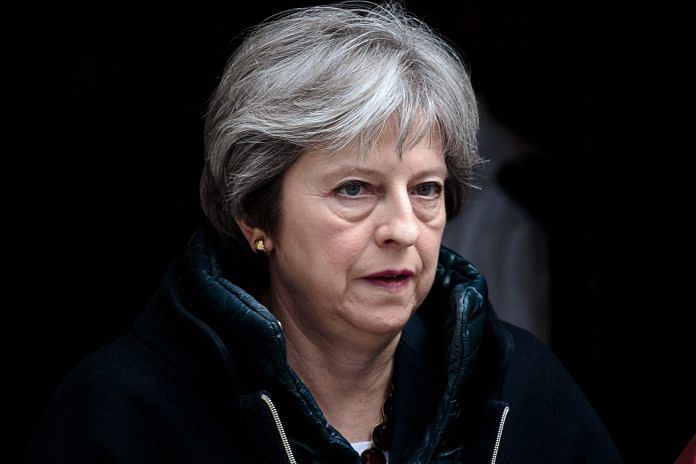May’s strong steps
“The prime minister makes a compelling case for Kremlin culpability in the Salisbury incident and is right that such a reckless, hostile act by another state requires a robust response,” The Guardian editorializes.
Diplomatically, there is no ideal response to the attempted murder of Sergei and Yulia Skripal on British soil. One possible motive is to instigate a diplomatic fight with the UK, and by pushing back, Theresa May is giving Putin the reaction he wants. “But treating the incident as anything less than an outrageous aggression looks weak. It signals that the use of a chemical weapon on British streets could somehow be excusable.”
“Mrs May was right to set out a measured retaliatory response. Some of these were economic, targeting financial assets that might abet Russian espionage. Others focused on that capability more directly, including the expulsion of 23 diplomats, identified as “undeclared intelligence officers”. Mr Putin is unlikely to change his foreign policy as a result of unilateral British action. And, while Nato allies and the EU have offered words of solidarity, there is much uncertainty around the potential for coordinated containment of the Kremlin. The lack of such cohesion – especially when Brexit makes Britain look strategically dislocated – may have emboldened Russia.”
But nations should never act in haste over such issues. The Guardian writes that an escalation in the diplomatic crisis is inevitable. “There is likely to be a campaign of obfuscation and misinformation directed at British audiences. That is the Kremlin’s well-established modus operandi. When matters of national security come to the fore, governments do not acquire a licence to act without check or criticism.”
“But it is also vital to keep sight of the facts. Britain has been targeted with a chemical weapon and it is almost certain that there is only one plausible culprit with the means and the motive. The prime minister might not have as many tools for retaliation, unilateral or international, as she would like. But she has judged correctly that the time for equivocation, given the sinister nature of Mr Putin’s regime, is over.”
Deadly country for environmentalists
Corruption in the Honduras is deadly, claims an editorial in the New York Times. The links between the government, military and business elite show the culture of corruption in the country, which is the deadliest in the world for environmental activists.
After the death of the activist Berta Cáceres, “a team of international lawyers found that the killing had been months in the planning. The United States joined in pressuring the Honduran government to solve the case. Mr. Castillo’s arrest suggests the pressure worked.”
“As the Cáceres investigation was making headlines, the president of Honduras, Juan Orlando Hernández, twisted the law to run for re-election and win a vote so dubious that international observers called for a new election. Yet the Trump administration kept quiet. Mr. Hernández, who came to power after a coup supported by the Obama administration, has been a willing ally of Washington, whether fighting terrorism and drugs or stopping migrants.”
“Mr. Hernández may not be directly involved in the murder of Ms. Cáceres. But for the United States to demand that her murder be solved while cynically enabling the corrupt politics behind it makes it more likely that hers will not be the last killing.”
Merkel’s last term
“Having spent almost six months reaching a coalition deal, Germany’s new government—which takes office today—has just three-and-a-half years until the next election is due, in 2021,” writes The Economist.
“It is, you see, very unlikely that Mrs Merkel will seek to run again. So her swearing in for her fourth term as chancellor today, under the glass dome of the restored Reichstag building in Berlin, was probably her last. Even that moment, something of a formality once coalition deals are done, added to the mood of transition.”
“What to do with the limited time and a modest majority? The chancellor does not ruminate publicly about her legacy, but—a keen reader of history books—has presumably contemplated it privately.” Her final chapters as chancellor might include supporting development in Africa, promoting tech industries, and improving the governance of globalisation.
“The best chance of the grand coalition achieving something of substance lies between the domestic and the world planes: on the European one. The benign economic conditions combined with the election of Emmanuel Macron, about as German-friendly a candidate as Berlin could hope for, to the French presidency creates a rare opportunity to reform the EU. That means closer economic- and foreign- and defence-policy integration, but most significantly (with Italy’s chaotic election result just the latest reminder that the euro-zone crisis was never permanently dispatched) integration of the single currency.” This looks like it will be toughest project for her, as Merkel and Macron are the last two big leaders to believe in a united Europe.
“The chancellor has the time, opportunity and most importantly the good reasons to achieve something of substance on Europe, but only if she is willing to fight for it in Berlin. Now to see if she does.”



